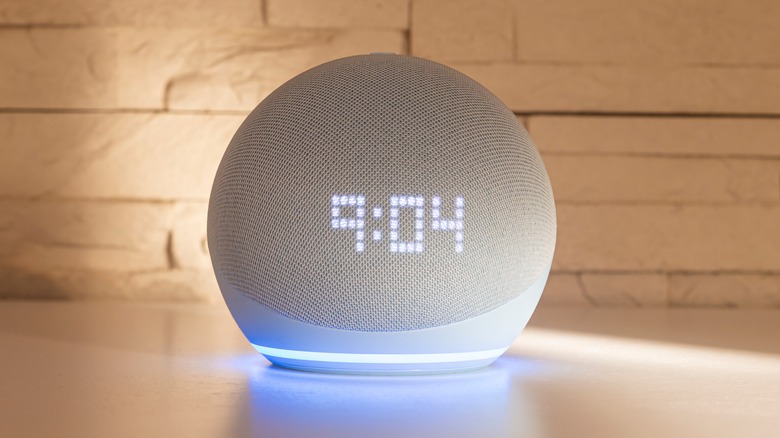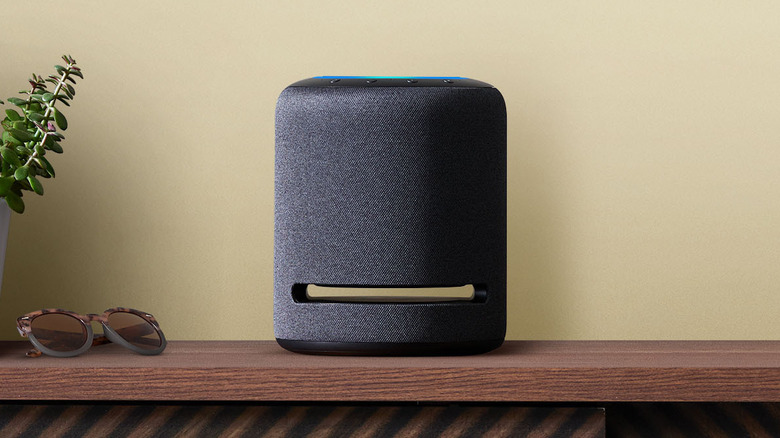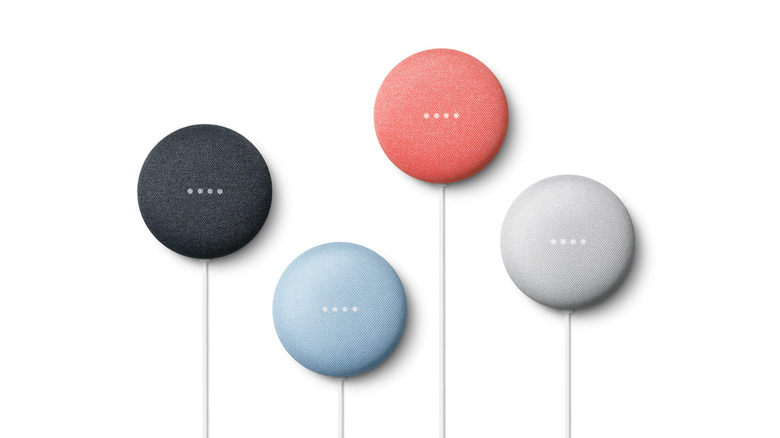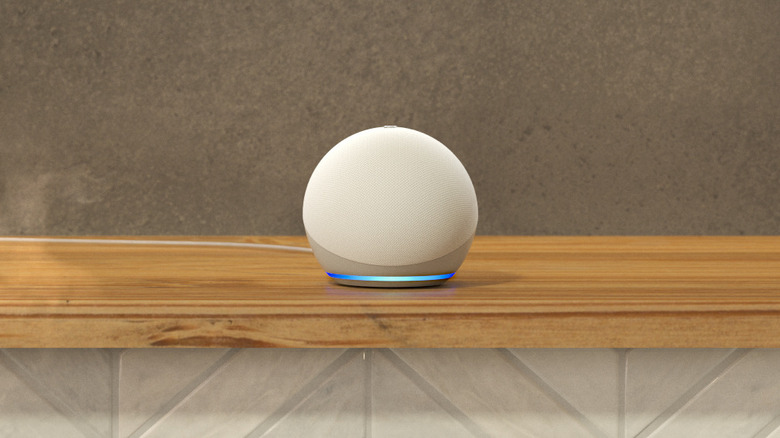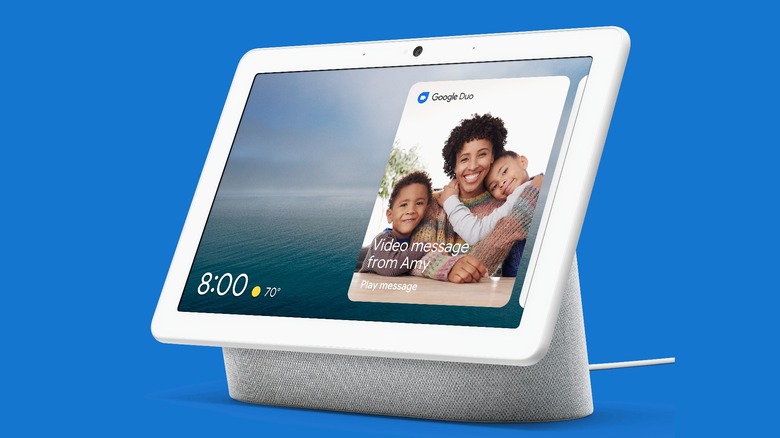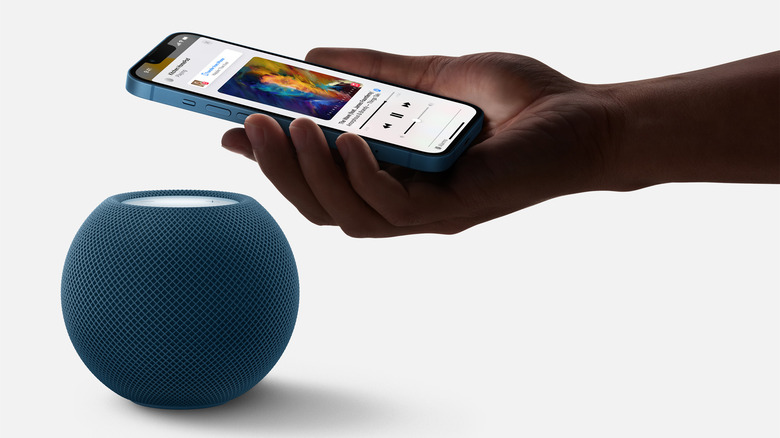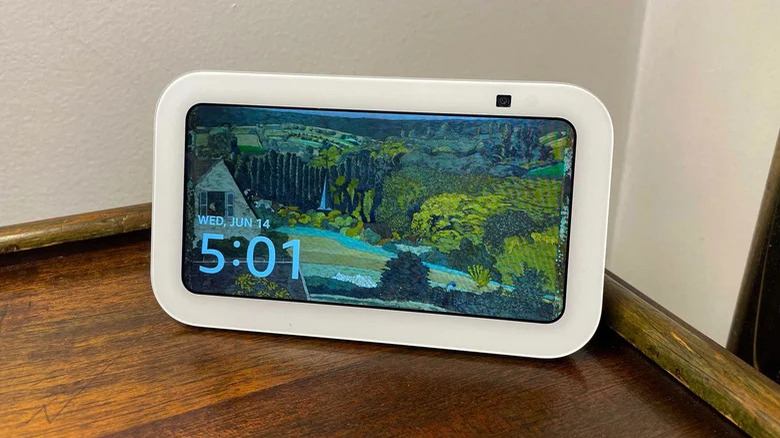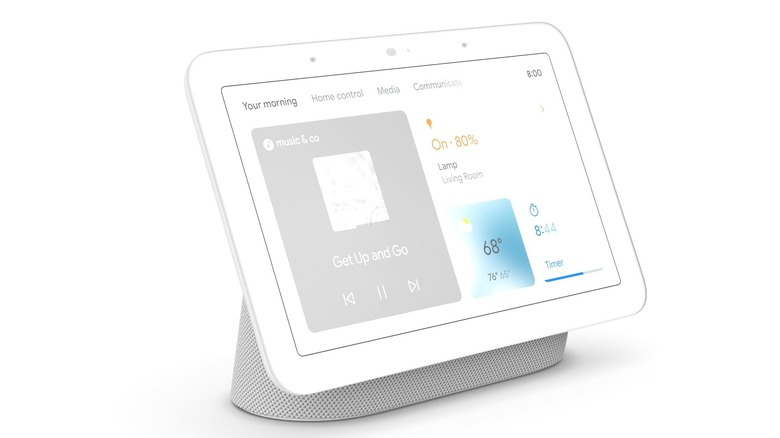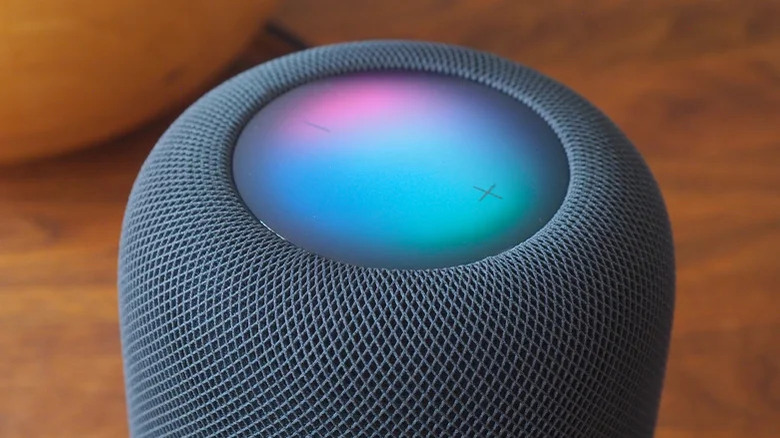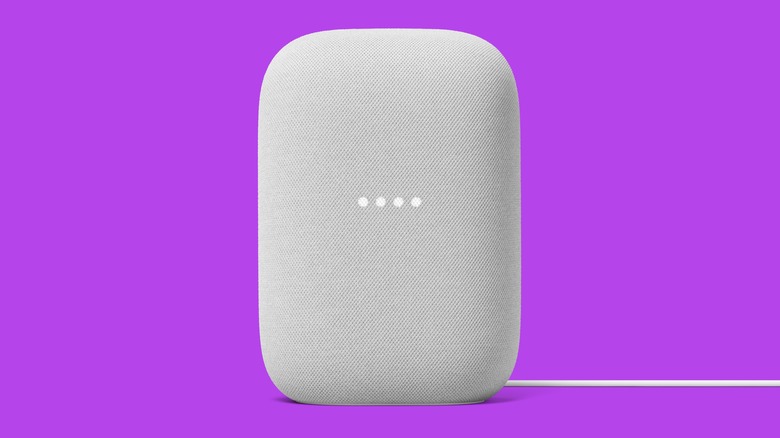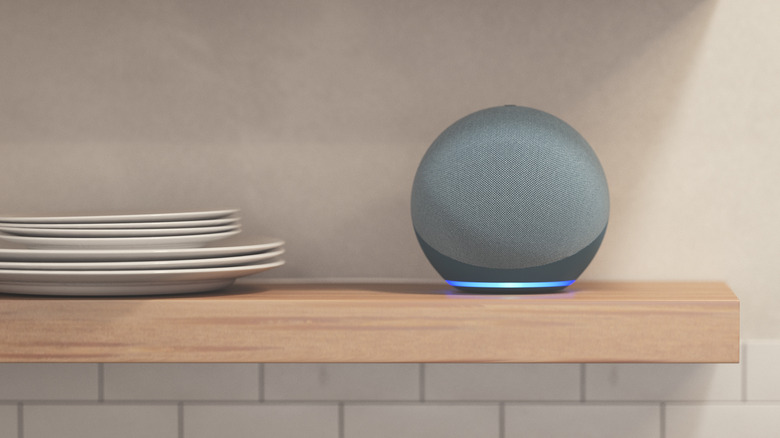The 10 Best Home Assistant Devices Of 2023, Ranked
We may receive a commission on purchases made from links.
From smartphones and TVs to kitchen fridges, a wider array of tech than ever now comes with voice assistant integration as standard. Home assistant devices from the likes of Google and Amazon are no longer as essential to enjoying the convenience of voice-activated tech, and so the latest generation of home assistants on the market have had to evolve to be better than ever to keep buyers interested.
To keep things simple, we're only focusing here on devices that are primarily made as home assistants rather than third-party smart speakers with voice assistant integration. Keep in mind, too, that this ranking is only intended as a rough guide, and whether you're in the Google, Apple, or Amazon camp, evaluating how well a home assistant will mesh with your current smart home setup is just as important as the individual device itself.
Nonetheless, this roundup should give you an overview of some of the best devices on the market and how they compare in both price and features against each other.
10. Amazon Echo Studio
The largest and heaviest product in Amazon's Echo line of devices, the Echo Studio is a significant step above its lesser siblings in terms of audio quality. It's more than capable of filling a room with crisp, clear sound, making it a worthy rival to third-party speakers from the likes of Sonos and Bose as well as being more than just a home assistant device. It also integrates Zigbee, which allows it to talk to other smart home devices that a smartphone wouldn't necessarily be able to. This, in turn, means it can be used in place of a standard smart home hub.
The 3.5mm input jack lets it double up as a speaker for a TV or audio system, although it's also possible to connect TVs wirelessly to the Echo Studio using a Fire Stick. There are two significant downsides to the device, however, with the first of those being its size. One of the key benefits of many home assistants is that they're compact enough to fit in any room of the house, but the 8-inch high and 7-inch wide Echo Studio is limited to places with plenty of spare space.
The other downside is its price. At $199.99 on Amazon, it's one of the pricier home assistants out there, and there are plenty of rival smart speakers available at a similar price.
9. Google Nest Mini (2nd Gen)
The latest generation of the Google Nest Mini has been out for a few years now, but it's still great value for anyone looking for a budget home assistant device. At a retail price of $49.99, it's about the cheapest way to add Google Assistant to your home tech setup. The low price does mean that there are some compromises to be made — speaker quality and volume are somewhat lacking compared to pricier devices, although the second generation of the Mini did boast some notable improvements to both aspects.
The Nest Mini is most useful for anyone who's not fussed about sound quality and simply wants to add a Google Assistant to a room. Both the Nest Audio and Nest Mini will work together under one Google Home setup, making the Mini a great cost-effective option for adding extra coverage if you're looking to kit out an entire home with Nest devices.
8. Amazon Echo Dot (5th Gen)
As Amazon's equivalent of the Google Nest Mini, the fifth generation Echo Dot offers a lot of the same benefits as its chief rival. Namely, access to a leading voice assistant at an affordable price, but with the compromise that the speaker itself isn't all that great. It's identical in price to the Nest Mini, at $49.99 direct from Amazon. The microphones on this model are still very sensitive, which means that the Echo Dot should have no trouble picking up what you're saying, even in larger spaces.
While some would argue that the Echo Dot is the superior device in terms of sound quality, neither is going to be able to convincingly fill a room. Buyers looking for an Alexa-based home assistant to play music on a regular basis will definitely find it worthwhile to look further up the Echo line, but as an entry-level smart speaker for everyday voice command tasks, the Echo Dot is still a solid option.
7. Google Nest Hub Max
The Google Nest Hub Max does exactly what its name suggests –- it takes the design and functionality of the Nest Hub and cranks things up an extra notch. Well, mostly, it just cranks things up in size, as the Nest Hub Max takes up significantly more real estate than its smaller lineup sibling. That limits its practicality to a handful of rooms, with the kitchen being the most obvious candidate for the device.
It offers all of Google Home's smart home functions in one place through a touchscreen that's generally both intuitive and responsive to use. Among other things, it can be used to display Nest security cameras, stream YouTube, and adjust devices like smart lights, but it does come with one extra feature that's sure to put off some buyers.
There's a camera at the top of the screen, and there's no privacy cover for when it's not in use. This is because the Nest Hub Max uses facial recognition technology to detect who's looking at it and show them personalized results. This is an optional feature, though, and can be easily disabled. However, there are plenty of buyers who won't like the idea of a camera pointing at them at all, and Google's inclusion of a switch to turn off the camera won't do much to reassure them. Not to mention, the extra functionality comes at a steep price –- $229.99, to be exact.
6. Apple HomePod mini
Amazon and Google might be leading the charge when it comes to home assistants, but Apple also offers its own range of devices that integrate the Siri voice assistant. The HomePod mini is the cheapest of those, yet it's packed with features that make it a step above entry-level offerings from either of its two biggest rivals. The vast majority of these features will require you to be already ingrained in the Apple tech ecosystem, meaning Android users will miss out here.
The HomePod includes features like Intercom, which can send voice messages to either other HomePod devices or iPhones and iPads. You can also take calls with the iPhone integration or transfer music to the HomePod by simply holding your iPhone near the device. There's a lot to like considering the HomePod mini retails for a reasonable $99.00, although the biggest downside is Apple's refusal to make most of the HomePod's best features available to non-Apple devices.
If you already have smart home tech from a rival brand, or a member of your household owns a non-Apple smartphone, you'll be missing out on much of what the HomePod has to offer.
5. Amazon Echo Show 5 (3rd Gen)
While SlashGear wasn't entirely sold on previous generations of Echo Show devices, the third generation Echo Show 5 is an entirely different story. The screen adds an extra layer of functionality over other products in the Echo line, and there's also a front-facing camera that gives you the ability to video call through Amazon's in-house app — although the camera can be covered by a plastic privacy cover when it's not in use.
There's also built-in integration for Prime Video, although top third-party streaming platforms like YouTube don't have their own apps. It's still possible to watch them through the Show 5's web browser, but it's a clunky experience, so it's not recommended. It's a better speaker than an Echo Dot, too, with the curved design at the rear providing a decent amount of output considering its size.
When it's not in use, the Show 5 also functions as a digital photo frame and can cycle through a slideshow of your choosing. It's not without its flaws, however. Our reviewer thought the touchscreen left a little to be desired, and the inclusion of only Amazon's streaming services is a little disappointing, albeit expected. It's available on Amazon for $89.99, putting it in the mid-range of home assistant devices and making it well worth considering for the impressive additional capabilities offered alongside the Alexa voice assistant.
4. Google Nest Hub (2nd Gen)
If the Nest Hub Max is a little too big and impractical, then the second-generation Nest Hub is worth considering instead. It's designed for smaller rooms, being both significantly more compact in size and also featuring a Soli sensor for gesture control. The Soli sensor is also behind the Nest Hub's biggest party trick -– it can track your sleep without the need for a wearable device or an invasive camera. It's a surprisingly comprehensive tool, although we weren't entirely sold on its accuracy when we reviewed it at launch.
The sleep sensing tool also requires the Nest Hub to be by the bedside and facing the bed, which limits its usefulness. However, ignore the sleep tracking function and it's just as adept at blending into other rooms and features a similar suite of features to the Nest Hub Max, including Nest camera integration and video streaming. The speaker is also decent given its size, although it can't quite match what a dedicated standalone speaker could offer. Perhaps most importantly, it's also a lot more affordable than either a dedicated speaker or the Nest Hub Max – at $99.99, it's less than half the price of its larger sibling.
3. Apple HomePod (2nd Gen)
The second generation HomePod was unveiled earlier in 2023, and it's full of iterative improvements over the original. Most notable is the sound quality, which rivals that of the Echo Studio, but in a smaller package and with better integration into the Apple ecosystem. Much like the Echo Studio, the HomePod can be used as a smart home hub through HomeKit, with support for an increasing list of devices from various brands. It also boasts all of the Apple-specific features of the HomePod mini, with little difference in functionality between the two devices.
The HomePod, however, is much pricier –- at $299.00, it's the most expensive home assistant on this list. However, for a household filled with Apple products, it's the most natural choice of the two. The HomePod mini can't fill a room with sound in the same way, but the larger HomePod can give even dedicated smart speakers a run for their money. It might be quite an investment for a home assistant, but then again, it's not like habitual Apple buyers aren't used to paying a premium for the company's products.
2. Google Nest Audio
It's tricky to strike the balance between low pricing and decent sound quality. Many buyers of home assistant devices aren't going to want to spend hundreds of dollars on a device, yet if the speaker makes their favorite album sound like a tinny, distorted mess, it's equally pointless.
This is where the Nest Audio gets things just about right. It retails for $99.99, but it's fully capable of filling a room with sound that's more than punchy enough for most people.
It also comes with Google's full suite of assistance features, which are particularly well-integrated for Android users. However, iPhone and iPad users aren't left out, as the Google Home app enables many of the same features. That makes the Nest Audio a great option for buyers with multiple tech brands in their household. It's also useful for kitting out an entire home with assistant devices -– at less than $100 a pop, you can buy multiple Nest Audios for the price of one Sonos or Bose smart speaker.
1. Amazon Echo (4th Gen)
The original smart speaker to launch onto the market is now in its fourth iteration, and it's better than ever. The Echo is identically priced to the Nest Audio, at $99.99 direct from Amazon. Which one to pick will likely come down to existing allegiances more than capabilities –- both are among the best value home assistants and both boast decent audio quality for the price. We thought that the Echo pipped the Nest Audio when it came to bass, but the Google device had the edge on the high-end. Both, however, are impressive given their asking price.
The latest Echo comes in a spherical shape, with a few basic touch controls at the top of the device. It will feel very familiar to set up and use for anyone who already has an Echo, but it boasts a few extra capabilities that its predecessors lacked. Those include the ability to use it as a home hub thanks to its Zigbee support and a new temperature sensor, which can be used for more advanced automation. The Echo might not boast the high-end sonic capabilities of the Echo Studio or the rock-bottom asking price of the Echo Dot, but for most people, it's the Echo that stands out as the best compromise in Amazon's lineup.
